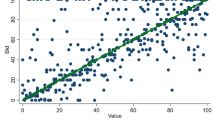Abstract.
We extend the results of Blume, Brandenberger, and Dekel (1991b) to obtain a finite characterization of perfect equilibria in terms of lexicographic probability systems (LPSs). The LPSs we consider are defined over individual strategy sets and thus capture the property of independence among players' actions. Our definition of a product LPS over joint actions of the players is shown to be canonical, in the sense that any independent LPS on joint actions is essentially equivalent to a product LPS according to our definition.
Similar content being viewed by others
Author information
Authors and Affiliations
Additional information
Received February 2002/Final version June 2002
We would like to thank Adam Brandenburger, Eddie Dekel, Arthur Robson, Peter Streufert, and Robert Wilson for their helpful comments. Govindan acknowledges research support from the Social Sciences and Humanities Research Council of Canada.
Rights and permissions
About this article
Cite this article
Govindan, S., Klumpp, T. Perfect equilibrium and lexicographic beliefs. Game Theory 31, 229–243 (2003). https://doi.org/10.1007/s001820200113
Issue Date:
DOI: https://doi.org/10.1007/s001820200113



